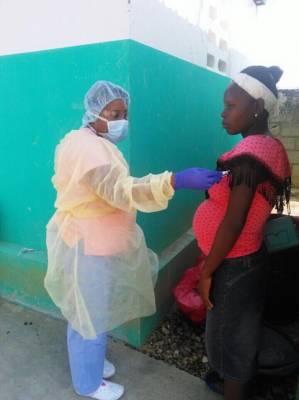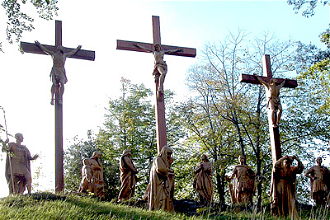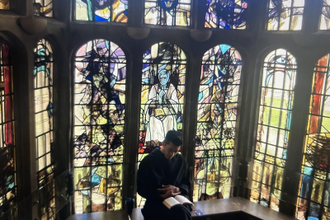How will the Global South survive COVID-19?

Casimir Merline, trained by Midwives for Haiti, screens a pregnant patient for COVID-19 at Montegrande Community Clinic, Haiti
The COVID-19 virus could reverse decades of progress in the global south in the event of sustained lockdowns, warn humanitarian aid groups. While developed countries are struggling to balance the need to restart the economy with the importance of protecting vulnerable members of society, the choices are even starker in poor countries.
Ballooning national and personal debt, a distrust of public health messages from governments and foreigners, the disruption of peace talks in conflict zones and delayed vaccination campaigns are just a few of the issues facing less developed nations. How can people self-isolate when they need to go out for food, since they lack refrigeration? How can you wash hands frequently without running water?
Independent Catholic News spoke to aid workers and business people in Chad, Rwanda and Haiti to gauge COVID-19's impact.
Mortality estimates for Africa range from 300,000 from Imperial College in London to 10 million (WHO). However, the 54 countries on the continent are responding in different ways, depending on how strong their governance is, and whether or not they have learned from previous pandemics.
The Chad Relief Foundation provides support to more than 95,000 refugees in southern Chad. "Our partners mobilized quickly, providing soap and buckets and spreading health messages about social distancing and hygiene," says director Sara-Christine Dallain. "But people live in close quarters. They've escaped violence in the neighbouring Central African Republic, and their coping mechanisms revolve around mutual support."
While some international NGOs are trying to provide digital and radio learning in the camps, the reach will be limited, making the educational gap between refugee children and others even worse. "People in refugee camps are already traumatized, feeling uncertainty and a lack of control. The response needs to be community driven and built upon the resilience and knowledge and networks of community members," says Dallain.
Meanwhile, in Haiti, rumours have led to aid workers being blamed for bringing the virus to the island. Local people have good reason to suspect foreigners; in 2010 UN peace keepers brought cholera with them, killing 9,000 Haitians and infecting 800,000. Midwives for Haiti has had to temporarily withdraw some staff for their own safety. Jane Drichta from Midwives for Haiti comments, "Our three international staff were evacuated in March, four days after Haiti's first case was reported and three and a half days after Haiti's borders closed. The confusion and lack of information during the evacuation process was intense, but eventually we got a grossly overpriced charter flight, $1200 per ticket to Miami, a flight of 90 minutes, usually costing under $200."
However, the charity's work continues. "We've educated almost 200 Haitian nurses in advanced obstetrical skills. Our community clinic midwives work at Ste Therese Hospital and our rural birth centre in Cabestor. They are frightened, of course, and are following all WHO recommendations. They enforce social distancing with patients, but it is impossible to remain highly separated in a place where people live tooth to jowl."
After getting his MBA, Abdoul Kwizera started the Smart Chicken Project, and was soon supplying restaurants, hotels and bars in Rwanda. A genocide orphan, Kwizera now sees significant challenges for the government during a national lockdown.
"People who had salaries are withdrawing their savings from banks, meaning it will be hard to get a loan when this is over; companies fired employees until the government ordered them to pay their staff - this will put businesses in debt; tourism has stopped, and there's inflation. Many people here work from day to day, so they have no savings. Every sector is closed, no work, no movement; it's like the end of the world."
The bustling market where Abdoul sold his eggs has closed, and he doubts people have enough money to buy his eggs for breakfast, so he gives them away to his neighbours.
The Rwandan government is also distributing food, as are the authorities in next door Uganda. Both are organized and efficient by regional standards, and they were quick to react when the virus appeared. But their hospitals and clinics lack the resources to handle a pandemic, so they have mobilzed local networks to educate their populations about prevention, and to test incomers. By contrast, the president of Tanzania told his citizens they will be protected from the virus by attending churches or mosques.
The Survivors' Fund provides counselling and training for Rwandan genocide survivors. Its director, Sam Munderere, says the lockdown meant that group counselling now takes place over the phone. "We are also finding that people's immediate needs are for food and money, so we are struggling to find the donations to offer help where it is needed. Many people live from day to day at the best of times, so if they are unable to leave the house, they have no income coming in to feed their families. This is especially important with people taking HIV medication which requires proper nutrition. In Rwanda, during this genocide commemoration period, it is traumatizing to see police and other security personnel in the streets, road blocks and public announcements telling people to stay indoors, seeing foreigners evacuated on planes because it brings back memories of the time of the genocide."
In addition, Munderere says it is a challenging time for genocide survivors who are taking HIV treatment. "For confidentiality, some genocide survivors prefer to get their ARVs from clinics away from their homes, where their history is not known. In the current situation, some survivors are not able to move from on district to another and have to make a decision to take the treatment from clinics near their homes."
Anyone interested in offering support to the NGOs mentioned in this article should contact me at Tinsleyrc@aol.com A small contribution will go a long way in these difficult circumstances.


















